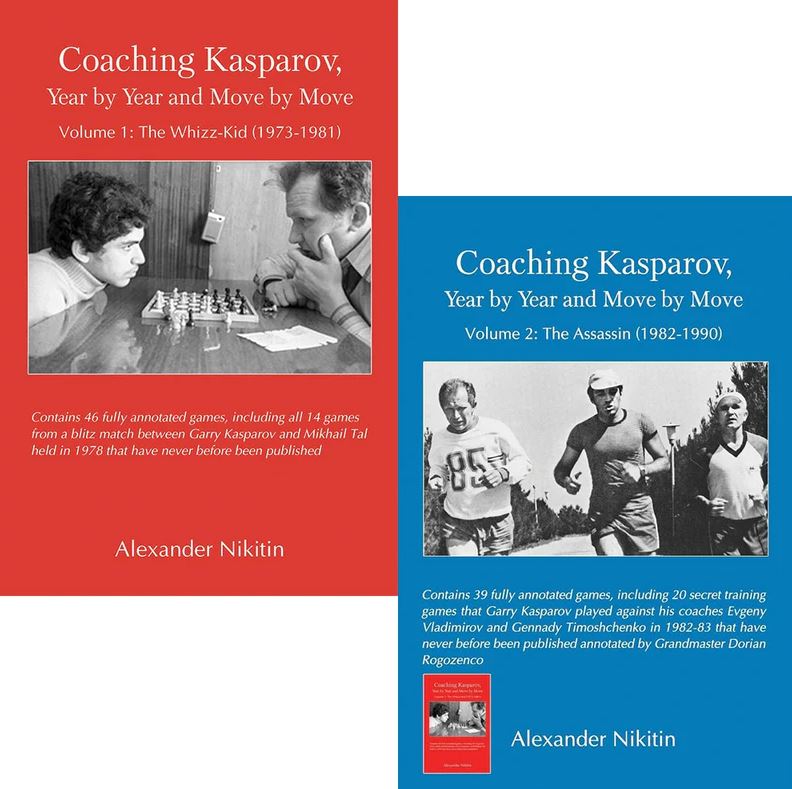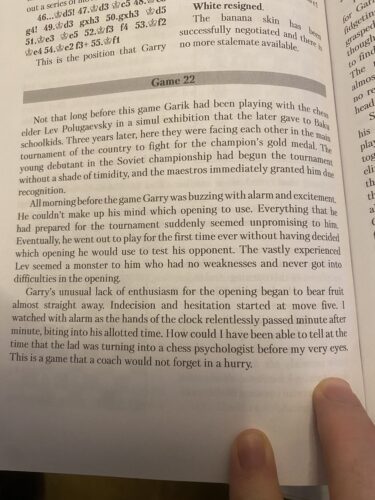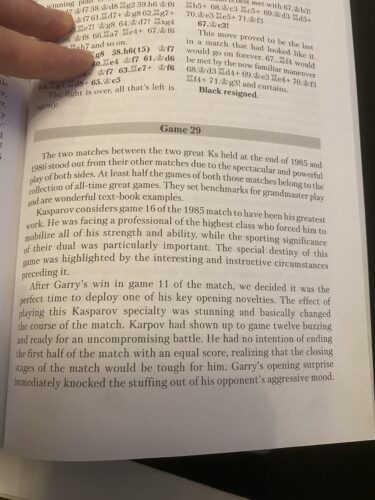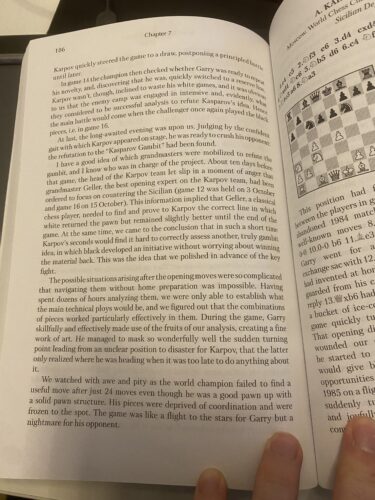Disclaimer 1: The following article contains several affiliate links to Amazon.com, meaning that if you go to Amazon and buy the recommended product (or some other product in an allotted period of time), the author of these lines will get a commission % from the purchase
Disclaimer 2: The following article is an excerpt from my article titled Best Chess Books 2022 in which I reviewed 20 chess books
Alexander Nikitin: Coaching Kasparov, Year by Year and Move by Move Volume 1: The Whizz-Kid (1973-1981) and Volume 2: The Assassin (1982-1990)
As mentioned in my review of Coaching The Chess Stars, after reading The Anand Files, I very much realized I am the ideal target audience for books where experienced coaches/trainers write about their experience while working with talented (young) players. When I learned somewhere in 2022 that the publishing house Elk and Ruby 1 published a two-part book written by Alexander Nikitin – former coach of Garry Kasparov, it shouldn’t come as a surprise that I bought them almost immediately. 2
The first book covers Kasparov’s childhood years (1973-1981), while the second book is devoted to his later years (1982-1990) during which he played five World Chess Championship matches against Anatoly Karpov – but also became increasingly engaged as a chess politician.
Both books are organized in a very similar manner. Just like The Life and Games of Vassily Smyslov, the initial part of the book consists purely of the prose, while the chess games are isolated from the rest of the prose and provided at the end of the book in the form of a separate, „Selected Games“ chapters.
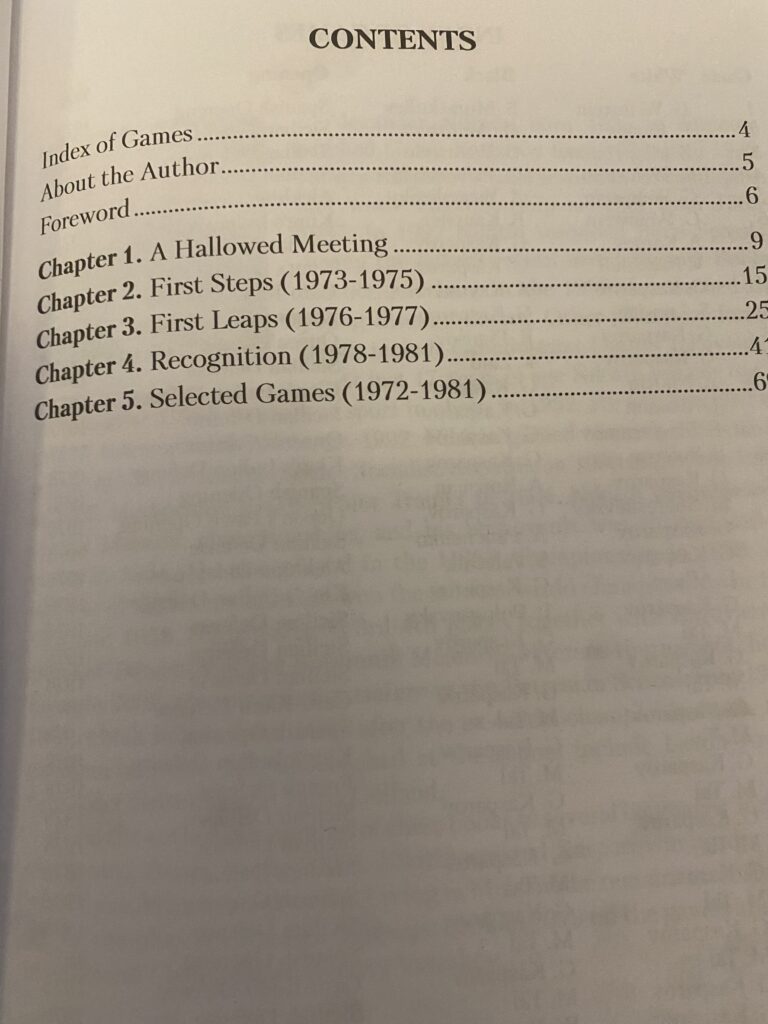
As I mentioned in the review of Andrey Terekhov’s masterpiece – I am personally not a big fan of this editorial decision as I feel it interrupts the continuity and the flow, given that the games are often very much referenced in the text (and vice versa). Although for some reason, I wasn’t that much bothered with it in the case of Coaching Kasparov, as I didn’t find myself scrolling back and forth as with the Life and Games of Vassily Smyslov.
As for the content of the book, I found it – unsurprisingly – fascinating and extremely interesting. Nikitin is very elaborate and transparent in his writing and talks in great detail about Garry’s life and career and how it got intertwined with his own. There are numerous episodes depicting Nikitin own’s relationship with Garry, Garry’s relationship with Botvinnik, the role of Klara Kasparovna 3 and her influence on her son, the role of the Soviet authorities and the general political climate at a time, behind-the-scenes events during Karpov-Kasparov matches, and much more.
Another thing I really liked about Nikitin is his directness and firm belief in his own opinions. There are several places where he doesn’t hesitate to criticize Kasparov – especially in the second book – when Kasparov got older, became the World Champion, and got more politically involved, as this was also the time when his relationship with Nikitin started deteriorating. In several places, he also mentions very openly how he thinks the influence of Klara Kasparovna was negative and affected Kasparov’s preparations for different tournaments. As I mentioned in my review of Chessays – such candid and open writing is becoming a dying sport, therefore it is very refreshing to see.
Another thing that was really interesting to read was Nikitin’s overall insights and thoughts. Throughout the book, Nikiting very much provides us with his coaching philosophy and approach, talks in great detail about what the training sessions with Garry looked like, and touches on different non-chess aspects of being a chess professional. Through that, he provides us with glimpses of his broader life philosophy and formulates some very profound ideas. I remember I was particularly impressed with his thoughts on the so-called „celebrity disease“ – the conceit arising from being successful in a certain field. When refering to reasons for Kasparov’s underperformance in a certain tournament, Nikitin writes that:
„ The rapid accumulation of his [Kasparov’s] sporting achievements had led him to overestimate his abilities and place in the chess hierarchy, as well as his position in society… The recipe for treating celebrity disease is well known – to nurture objectivity in everything and to avoid thinking everybody else is a nobody just because they play chess than you. Not to believe that the GM title isa measure of intelligence or life wisdom. Alas, much of such treatment depends not on the doctor, but on the patient. It’s particularly hard to treat this disease among young people.“ 4
Nikitin’s profoundness and candidness are also apparent once you get to the actual games. In contrast to Coaching the Chess Stars which gives minimum background info before each individual encounter, Coaching Kasparov provides the reader with a TON of info – especially once the book starts covering the games from Kasparov – Karpov matches: 5
The games themselves are very fascinating and interesting – especially in Part 1 of the book which covers the games from Kasparov’s youth. Not only was I less familiar with these compared to the games from Kasparov – Karpov matches – but they are also full of youthful energy and very spectacular. I have heard several people say that young Kasparov is their favourite player, and after going through some of the masterpieces, I can wholeheartedly agree. There are so many examples to choose from, but this training game he played against Elmar Magerramov is definitely one of my favourites:
The analysis of the games is also much better compared to your average chess book and features quite some annotations. Sure, there are places where the author goes a little bit too deep with the engine and the number of diagrams could definitely be improved. But on average, I wasn’t bothered with this aspect at all – especially since the rest of the book was so interesting.
What I had a slight problem with was Nikitin’s bias and lack of objectivity in the second part of the book. I felt that Nikitin is extremely subjective on the topic of Kasparov – Karpov matches due to his lifelong issues with Karpov and his backers, which made the whole thing read like a personal vendetta against Karpov rather than an objective report. 6
In general, I found part 1 of Coaching Kasparov more compelling and interesting than part 2, mainly because I was not as familiar with Kasparov’s youth to the very same extent as with his later years.
But irrespective of that, both volumes of Coaching Kasparov are an absolute must-read – especially for any lover of chess history, culture and stories.
- Which is somehow underrated, in my opinion
- Especially since Kasparov is by far my favourite player whom I still consider to be the greatest of all time, even though the recent success of Magnus Carlsen in the World Rapid and Blitz Championship seriously buffs Magnus’ own claim for that title
- Garry’s mother
- I have a feeling many modern chess players and GMs would benefit from reading this and reminding themselves that their GM title doesn’t make them better than other people.
- In general, everything I complained that Coaching the Chess Stars is missing is present in this book
- I feel Timman’s The Longest Game does a much better job of providing the reader with a more objective picture, especially in regard to the controversial 1984 match

